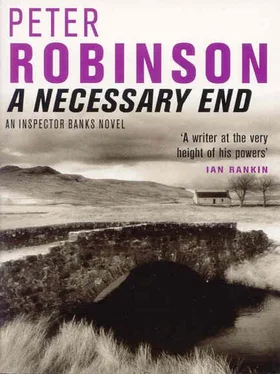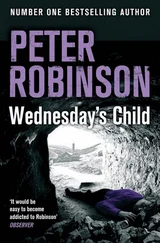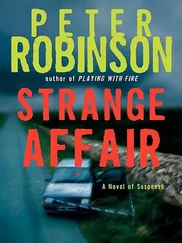Peter Robinson - A Necessary End
Здесь есть возможность читать онлайн «Peter Robinson - A Necessary End» весь текст электронной книги совершенно бесплатно (целиком полную версию без сокращений). В некоторых случаях можно слушать аудио, скачать через торрент в формате fb2 и присутствует краткое содержание. Год выпуска: 1989, ISBN: 1989, Издательство: Avon, Жанр: Полицейский детектив, на английском языке. Описание произведения, (предисловие) а так же отзывы посетителей доступны на портале библиотеки ЛибКат.
- Название:A Necessary End
- Автор:
- Издательство:Avon
- Жанр:
- Год:1989
- ISBN:9780330514729
- Рейтинг книги:5 / 5. Голосов: 1
-
Избранное:Добавить в избранное
- Отзывы:
-
Ваша оценка:
- 100
- 1
- 2
- 3
- 4
- 5
A Necessary End: краткое содержание, описание и аннотация
Предлагаем к чтению аннотацию, описание, краткое содержание или предисловие (зависит от того, что написал сам автор книги «A Necessary End»). Если вы не нашли необходимую информацию о книге — напишите в комментариях, мы постараемся отыскать её.
A Necessary End — читать онлайн бесплатно полную книгу (весь текст) целиком
Ниже представлен текст книги, разбитый по страницам. Система сохранения места последней прочитанной страницы, позволяет с удобством читать онлайн бесплатно книгу «A Necessary End», без необходимости каждый раз заново искать на чём Вы остановились. Поставьте закладку, и сможете в любой момент перейти на страницу, на которой закончили чтение.
Интервал:
Закладка:
Peter Robinson
A Necessary End
1
I
The demonstrators huddled in the March drizzle outside Eastvale Community Centre. Some of them held homemade placards aloft, but the anti-nuclear slogans had run in the rain like the red lettering at the beginning of horror movies. It was hard to make out exactly what they said any more. By eight-thirty, everyone was thoroughly soaked and fed up. No television cameras recorded the scene, and not one reporter mingled with the crowd. Protests were passe, and the media were only interested in what was going on inside. Besides, it was cold, wet and dark out there.
Despite all the frustration, the demonstrators had been patient so far. Their wet hair lay plastered to their skulls and water dribbled down their necks, but still they had held up their illegible placards and shifted from foot to foot for over an hour. Now, however, many of them were beginning to feel claustrophobic. North Market Street was narrow and only dimly lit by old-fashioned gaslamps. The protestors were hemmed in on all sides by police, who had edged so close that there was nowhere left to spread out. An extra line of police stood guard at the top of the steps by the heavy oak doors, and opposite the hall more officers blocked the snickets that led to the winding back streets and the open fields beyond Cardigan Drive.
Finally, just to get breathing space, some people at the edges began pushing. The police shoved back hard. The agitation rippled its way to the solidly packed heart of the crowd, and suppressed tempers rose. When someone brought a placard down on a copper's head, the other demonstrators cheered. Someone else threw a bottle. It smashed harmlessly, high against the wall. Then a few people began to wave their fists in the air and the crowd started chanting, "WE WANT IN! LET US IN!" Isolated scuffles broke out. They were still struggling for more ground, and the police pushed back to contain them. It was like sitting on the lid of a boiling pot; something had to give.
Later, nobody could say exactly how it happened, or who started it, but most of the protestors questioned claimed that a policeman yelled, "Let's clobber the buggers!" and that the line advanced down the steps, truncheons out. Then all hell broke loose.
II
It was too hot inside the Community Centre. Detective Chief Inspector Alan Banks fidgeted with his tie. He hated ties, and when he had to wear one he usually kept the top button of his shirt undone to alleviate the choking feeling. But this time he toyed with the loose knot out of boredom, as well as discomfort. He wished he was at home with his arm around Sandra and a tumbler of good single-malt Scotch in his hand.
But home had been a cold and lonely, place these past two days because Sandra and the children were away. Her father had suffered a mild stroke, and she had taken off down to Croyden to help her mother cope. Banks wished she were back.
They had married young, and he found that the single life, after almost twenty years of (mostly) happy marriage, had little to recommend it.
But the main cause of Banks's ill humour droned on and on, bringing to the crowded Eastvale Community Centre a particularly nasal brand of Home Counties monetarism. It was the Honourable Honoria Winstanley, MP, come to pour oil on the troubled waters of North-South relations. Eastvale had been blessed with her presence because, though not large, it was the biggest and most important town in that part of the country between York and Darlington. It was also enjoying a period of unprecedented and inexplicable growth, thus marking itself out as a shining example of popular capitalism at work. Banks was present as a gesture of courtesy, sandwiched between two taciturn Special Branch agents.
Superintendent Gristhorpe had no doubt assigned him, Banks thought, because he had no desire to listen to the Hon Honoria himself. If pushed, Banks described himself as a moderate socialist, but politics bored him and politicians usually made him angry.
Occasionally, he glanced left or right and noticed the restless eyes of the official bodyguards, who seemed to be expecting terrorist action at any moment. For want of their real names, he had christened them Chas and Dave. Chas was the bulky one with the rheumy eyes and bloated red nose, and Dave was blessed with the lean and hungry look of a Tory cabinet minister. If a member of the audience shifted in his or her seat, raised a fist to muffle a cough or reached for a handkerchief, either Chas or Dave would slip his hand under his jacket towards his shoulder-holster. It was all very silly, Banks thought. The only reason anyone might want to kill Honoria Winstanley would be for inflicting a dull speech on the audience. As motives for murder went, that came a long way down the list-though any sane judge would certainly pronounce it justifiable homicide.
Ms Winstanley paused and took a sip of water while the audience applauded. "And I say to you all," she continued in all-out rhetorical flight, "that in the fullness of time, when the results of our policies have come to fruition and every vestige of socialism has been stamped out, all divisions will be healed, and the north, that revered cradle of the Industrial Revolution, will indeed prosper every bit as much as the rest of our glorious nation. Once again this will be a united kingdom, united under the banner of enterprise, incentive and hard work. You can already see it happening around you here in Eastvale."
Banks covered his mouth with his hand and yawned. He looked to his left and noticed that Chas had become so enrapt by Honoria that he had momentarily forgotten to keep an eye open for the IRA, the PLO, the Baader Meinhof group and the Red Brigade.
The speech was going down well, Banks thought, considering that members of the same government had recently told the north to stop whining about unemployment and had added that most of its problems were caused by poor taste in food. Still, with an audience made up almost entirely of members of the local Conservative Association — small businessmen, farmers and landowners, for the most part — such whole-hearted enthusiasm was only to be expected. The people in the hall had plenty of money, and no doubt they ate well, too.
It was getting even hotter and stuffier, but the Hon Honoria showed no signs of flagging. Indeed, she was off on a laudatory digression about share-owning, making it sound as if every Englishman could become a millionaire overnight if the government continued to sell off nationalized industries and services to the private sector.
Banks needed a cigarette. He'd been trying to give up again lately, but without success. With so little happening at the station and Sandra and the children away, he had actually increased his intake. The only progress he had made was in switching from Benson & Hedges Special Mild to Silk Cut. He'd heard somewhere that breaking brand loyalty was the first step towards stopping entirely. Unfortunately, he was beginning to like the new brand more than the old.
He shifted in his seat when Honoria moved on to the necessity of maintaining, even expanding, the American military presence in Britain, and Chas gave him a challenging glance. He began to wonder if perhaps this latest digression was a roundabout way of approaching the issue the many people present wanted to hear about.
There had been rumours about a nuclear-power station across the North York Moors on the coast, only about forty miles from Eastvale. With Sellafield to the west, that was one too many, even for some of the more right-wing locals. After all, radioactivity could be quite nasty when you depended on the land for your prosperity. They all remembered Chernobyl, with its tales of contaminated milk and meat.
Читать дальшеИнтервал:
Закладка:
Похожие книги на «A Necessary End»
Представляем Вашему вниманию похожие книги на «A Necessary End» списком для выбора. Мы отобрали схожую по названию и смыслу литературу в надежде предоставить читателям больше вариантов отыскать новые, интересные, ещё непрочитанные произведения.
Обсуждение, отзывы о книге «A Necessary End» и просто собственные мнения читателей. Оставьте ваши комментарии, напишите, что Вы думаете о произведении, его смысле или главных героях. Укажите что конкретно понравилось, а что нет, и почему Вы так считаете.












